#language blr
Explore tagged Tumblr posts
Text


coffee + ancient greek ˖˚⊹ ꣑ৎ (or pics from study sessions that i never posted)
#studyblr#study blog#studying#studyinspo#studyspo#ancient greek#study motivation#uni studyblr#dark academia#study aesthetic#study inspiration#study inspo#study movitation#uniblr#langblr#ancient greek language#language blr#language learning#language study#student life#uni life#uni student#university student
2K notes
·
View notes
Text





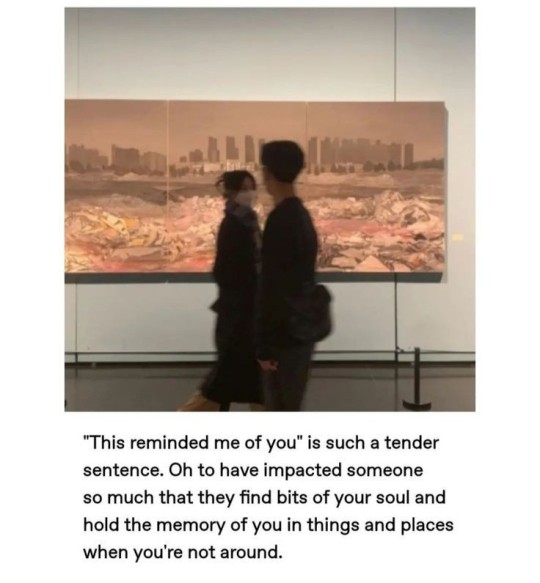



He's more myself than I am ,whatever our souls are made up of , his and mine are the same
-Wuthering heights, Emily bronte
#web weaving#dark web#soulmates#all credits to pinterest#dark acadamia aesthetic#dark acadamia quotes#dark acamedia#classic literature#literaure#language blr#lit#love#Greif#light acadamia aesthetic#poetry#writing#writers and poets#cottage academia#aesthitics#beautiful quote#kafka#spilled writing#spilled thoughts#spilled love#moodboard#books and quotes#web weavings#romanticism#on life#dark academia books
3K notes
·
View notes
Text
JLPT N5 - している [Part 2]
Hey everyone, welcome to Part 2 of talking about している. This N5 grammar point is very basic but also very important. Let’s get into it shall we!
But first, here is your vocabulary:

【English Helping Verbs】
As I mentioned in Part 1, the “して“ in している can stand for any verb in て form. Sometimes it is actually する, but most times it will be some other verb.
Ok great, but what is the いる part?? Take a look at the following English sentences:
① Traffic accidents often occur here.
② I am eating.
③ The window is open.
Two of these sentences have both a helping verb and a main verb. In #1, there is only a main verb, which is “occur”. In #2 the main verb is “eating” and the helping verb is “am”. In #3 the main verb is “open” and the helping verb is “is”. Notice that one of the main verbs has the -ing suffix while the other two don’t. Make a mental note of this for later. 😉
【The いる in している】
Japanese also has helping verbs. Allow me to introduce you to one of the most common ones: いる!
The いる helping verb* adds nuance to the main verb. But here’s the thing - there are different versions of いる!In the している Part 1 article, you actually saw what I call the いる of Repetition. This いる does not translate to the -ing form of our verbs in English. If you see よく起きている for example, you should think “often occur(s)”. This is similar to example #1 above.
Examples #2 and 3 are not actions of repetition. For them, we need the other いる, which I call the いる of State or Condition. This いる sometimes makes us use that -ing suffix in our English translations. So if you just see 食べている, by default it would mean “started eating and then stayed in that state for some period of time”. Instead of all that, in English we would simply say “is eating”. This is similar to example #2 above.
開く is a different type of verb than 食べる**. Because of this, the いる of State or Condition does not lead to us using the -ing form. In this case, something is open and stays in that state for some period of time. We don’t say “is opening”. Instead we just say “is open”. For verbs like 開く, their English translations won’t use that -ing form. Instead they will be like example #3 above.
The key to the している grammar point is understanding what kind of main verb you have, and then which helping verb いる you are reading/hearing!
【いる of State or Condition】
Here are some examples where the helping verb いる expresses a state or condition.

This is how you say example #3 in Japanese.

= Tom is currently in the Philippines.
Interestingly, you could also say the following:
⑥ トムはフィリピンに来ています。***
⑦ トムはフィリピンにいます。
#5, 6 and 7 all say that Tom is in the Philippines but the nuance is different in each of them!
#5 says that Tom went to the Philippines and stayed there. This means that the speaker is NOT in the Philippines. On the other hand, #6 says that Tom came to the Philippines and then stayed there, meaning that the speaker is also there. #7 simply says that Tom is in the Philippines. We don’t have any information about where the speaker is located.

= Mizuki is wearing a white skirt and hat.
#8 has several things that I want to point out: First is that the て form of a verb can mark the end of a comment. Example 8 has two comments of equal value. This is one version of a Japanese compound sentence.
The second thing is that the ending helping verb can actually apply to TWO DIFFERENT main verbs! Native speakers hear #8 and understand the verbs to be both はいています as well as かぶっています.
The last thing is that verbs connected to clothes are very interesting. When you attach the helping verb いる, they can sometimes express the state of wearing something. However, in some contexts they can instead express the action of putting something on. For the N5 level luckily you won’t have to distinguish between wearing and putting on clothing so no worries. It is good to keep this tidbit in the back of your mind for the future though.
【Conclusion】
So there you have it. Now you know that the している grammar point can express several situations. You could have:
・Repetition - there will be a word/phrase that indicates that the action happens repeatedly. The English translation won’t use the -ing form of a verb
・State or a Condition - there MAY or may not be a word/phrase indicating repetition. The main thing to focus on is whether the verb is an action verb or not. This will help you decide if you need -ing or not.
As always, keep your eyes and ears open for different kinds of examples and try to notice patterns. You can do it!
Rice & Peace,
– AL
👋🏾
*I purposely say “the helping verb いる“because there is also the regular いる verb. It’s the same with the “be”, “do” and “have” verbs in English. “Am” in “I am a teacher” plays a different role than the one in “I am eating.”
** 食べる is a transitive verb while 開く is an intransitive verb. Usually transitive verbs will translate to -ing and intransitive verbs won’t. Of course there are exceptions so keep an open mind.
*** When choosing between 来ている、行っている、and いる think about where the speaker is located as well as if you want to stress the movement of the subject.
#japanese#japanese studyblr#japanese language#japanese grammar#日本語#isshonihongo#jlpt n5#jlptn5#jlpt#nihongo#japanese langblr#learn japanese#japanese lesson#japanese study#studying japanese#japaneselessons#learnjapanese#language#languages#language study#language studyblr#language blr#日本語の勉強#にほんご
40 notes
·
View notes
Text
🌟 Learning Japanese 🇯🇵
🔔 あたしのガイドは、人が英語を話す向けー (◔‿◔)
The following guide is based on my personal experience. I am not an authority on the matter and I am still barely a beginner regarding Japanese.
What am I doing?
Learning languages seems non-lienar and that's partly true (at an intermediate level). But, when you're first starting out, there's generally clear goals to work toward.
Your Beginner Goals
Study and master kana
Japanese employs hiragana and katakana in conjunction with kanji. Together, hiragana and katakana make up kana.
Learn the kana (hiragana and katakana)
Learn the difference between kunyomi and onyomi (kanji)
Delve into grammar and establish some foundational vocab
Immerse yourself with input content (movies, shows, etc)
Study and practice a basic form of "pitch accent"
Continue developing your vocab and particle knowledge
Learn about polite versus casual talk and social culture
Use the language (letters, blog, diary, etc)
Seek conversations to apply the language properly
Find and study tests like JLPT to gauge your progress
What can I use?
Duolingo
If this was your first pick, you're naive but not foolish. It'll teach you enough to get help if you're lost in Japan. But it won't be enough to hold a conversation. Give it a try and see if it works for you. Duolingo is free.
I recommend using Duolingo as a supplementary learning tool rather than your primary learning tool
Textbooks and Guides
Many learners and even classes praise numerous textbooks. I for one received a recommendation for Tae Kim's Japanese Guide. So, I'll recommend it to you. Don't be afraid to see out other guides or attempt some textbooks. However, one should always remember that the textbook is NOT demonstrative of naturalistic Japanese.
For example, 「私は猫が好きです」 is what a textbook correctly teaches, though 「猫好きだよ」 is acceptable and more natural in casual Japanese
Building vocabulary
If you want to develop your vocabulary, you can use JLPT anki decks. Anki is a flashcard program for desktop and mobile. You can also use anki in conjunction with a dictionary like Jisho to create new flashcards decks (suited to the words you'd like to learn). You may also pick up vocab from Japanese media (i.e, anime, manga, books, content creators, music, etc).
If you're using Jisho and want to find a word you only know in English, search for it using quotation marks. For example, "school" or, if you want a verb "to learn" ~ it should help. You can spell out Japanese words normally by just typing... i.e, watashi.
Good input versus Bad input
Immersing yourself in Japanese media and culture is good but you need to be mindful of the content you're consuming— take note of the context behind events, interactions, or the relationship of speakers. Be especially mindful of anime and manga— both are known to use hyperbolic language or phrases that aren't commonly used in day to day conversation. Fortunately, some anime and manga do use everyday language, and you can usually find lists.
I recommend using the Tofugu blog to learn about both Japanese language and culture. But if you don't like reading, there are many YT channels like Kaname Naito and NihongoDekita with Sayaka. For general immersion though, here's a sweet vlog channel, a JP Warframe creator, and a natural born otaku.
#jp blog#jpblr#japanese#lang blog#langblr#lang#language blog#language blr#languages#language#duolingo#anki#jisho#immersion#input method#help#guide#study blog#studyblr#study#studying#japanese studyblr#japanese study
28 notes
·
View notes
Text
My top Russian Tv-Shows
Despite this being mainly a mandarinblr, I still try to practise my other languages so here are some of the most interesting tv-shows in russian for my fellow russian-learners and speakers and anyone interested.
Kitchen - Кухня This show has several spin-offs including Hotel Eleon and Grand which I will not mention as by the end of the last spin-off there are literally no characters from the original cast and the plot slightly goes of the rails. The actual show is set a french restaurant in Moscow where Max Lavrov, who just finished his military service decided to work at. The show follows the various challenges that Max faces at his new workplace, including the foul-tempered but very talented Chef Viktor Barinov who has a drinking problem and other interesting characters. It's quite funny and heart-warming, and it's a must-watch imo.
Youth - Молодёжка A pretty standard sports series tv plot. The hockey-team "Bears" are a meh team at best, but that all changes when a former National Hockey League player turned coach shows up to make a proper team out of them. I only watched the first season because after that the plot got a tad boring for me, but as far as sports series go, pretty good.
Law of the Lawless (Not the 1964 film!) - Бригада A cult-classic staple of only 15 episodes. The plot is a bit over the place at the beginning, as opening episodes sequence is a flashback to the start of the final episode but after that it's chronological, with the first episode w english subtitles here. 4 best friends start out as youths from early 1990s to 2000s, with one returning home after finishing his army service with plans for uni and the others just starting their lives. However, the Perestroika had significantly changed their lives, so eventually the gang turns from racketeering and petty crime to slowly becoming the mafia. The opening theme is worth watching alone, but then again I'm biased.
How I became Russian - Как я стал русским This comedy show is quite dear to me, as it follows an American journalist with russian and slavic roots navigating life and work in Russia as he works on a story about life in Russia for a major newspaper back home. He's back in his homeland but as a foreigner who finds his heritage utterly confusing. This series resonates with me, as despite having a good grasp of my cultures languages and customs, I still feel disconnected from my heritage at times, and this show has been a reassuring reminder that not being 100% attuned with your heritage is okay, and that there are many different ways of re-connecting with your culture.
Closed school - Закрытая Школа I was slightly tramuatized by this show when I first watched it 4ish years ago, in part due to how unhinged and off the rails the plot slowly but surely becomes. A descent into madness. Andrei and his sister are sent to study at the Logos boarding school, but are then informed that their parents have perished. Andrei doesn't believe this, so he sets off to investigate with his new friends and investigate he does. There are also some other background shenanigans going on, but the unraveling of the schools mystery remains the main interest, including its odd passageways and deeply disturbing history. As a thriller series, it honestly deserves that title.
Here are some shows that came out more recently that I think deserve a mention.
The Boy's Word: Blood on the Asphalt- Слова пацана кровь на осфальте I've only seen a few episodes out of the 8, but it's very Brigada-esque so far. During the mid-late 1980s when Perestroika is going on and the USSR is soon to be no more, 14 year old Andrei is trying to survive as he's constantly bullied at school and by gang-members. He makes friends with one of said gang members Marat, as he slowly descends into the world of street life. I'll finish watching this series sometime probably.
The new guy - Новенький 16-year old Max moves from his glamorous life in Moscow to a small-town Yurovsk due to his parents constant arguing, where he immediately doesn't get along with his clasmmates who think him stuck-up and start bullying him. One day Max goes missing and his classmates are the obvious suspects, as slowly but surely secrets start to emerge revealing everyone's lies. A pretty good suspense/thriller show, which covers the topics of bullying, coming of age and what it means to be an adult pretty well, despite the 4th and final season being kind of lackluster.
Central Russia's Vampires - Вампиры средней полосы Where to even begin with this show. I don't know whether I should introduce the trailer or the opening theme song mv. Basically the life of a small and unconventional vampire family living in Smolensk, presumably in central Russia, who get disturbed when bodies with distinct bite marks are found nearby. This results in the Guardians (aka the guys keeping vampires a secret and ensuring that no one acts out) taking over and investigating with the vampire leader Svyatoslav Vernidubovich given a week to find and punish the culprit. My odd plot description aside, the cast is why I adore this show. The recently turned Gen-Z wannabe blogger Zhenyok, the thousand year old grandpa Svyatoslav, the constantly annoyed Dr. Zhan Ivanovich (who is actually french and decided to hang around after Napoleon was defeated) and his ex-wife The Countess who honestly should have a spin-off show and many more characters.
Doomsday - Конец Света Satan decides to come back to Earth and start the apocalypse, for which he needs his son Dimyan who should become the Antichrist but to his dismay, Dimyan doesn't really care about world domination and money, he just wants to get married to his fiancee Galya and live happily ever after. Chaos ensues as satan tries to persuade Dimyan to join him, whilst Angel vs Demon shenanigans occur in the background. I honestly had no idea that this type of show could even be produced due to the censors and yet it was. It's kind of slightly similar to Good Omens with all the apocalypse stuff and the Angels and Demons eventually teaming up? Good Omens adjacent. Except more gritty with much darker humour. The actor who plays satan is Yuri Kolokolnikov who actually starred in game of thrones so if you're a fan of his acting, do try this show.
Alisa can't wait - Алиса не может ждать Alisa is a 15-16 (don't remember her exact age) year old girl who is going blind and she decides to do something really drastic to ensure that her life will be comfortable after she loses all sight. There's a noticeable build-up to what she's actually planning during the episodes, as her homelife is less than ideal, with her older sister stuck in an unhappy marriage and a turbulent relationship with her parents. This is one of the few shows that really left a deep impression on me but it deals with some very sensitive and potentially upsetting topics so be aware if you're giving it a go.
This list may be updated in the future, so if there are any other shows that I may have missed do share them!
#studyblr#russian#college life#tv#tv series#study blog#student#student life#travel blog#study motivation#aesthetic#slavic roots western mind#college#languagelearning#language#language stuff#language blr#language blog#tv shows#russian tv#russian tv shows#russian tv series#soviet movies#ussr#soviet#brigada#kitchen#Кухня#vampires#thriller
69 notes
·
View notes
Text
Language Learning Journey Update
It's been a while since I've been on Tumblr! In the months I've been away, I was focusing heavily on Persian and strengthening my skills in all areas of the language before I switch to a maintenance phase and pick up another language. During this time, I also got really into planning and journaling which has helped me better structure language learning in my schedule as well as reflect on how best to structure my time.
I certainly learned a lot from this time but the biggest takeaway for me is that my biggest pain point when learning a language is acquiring vocabulary. I tend to let it happen rather naturally (slowly) and while it's a valid method, it also leads me to stagnate and plateau. That's why, with the change in my language learning plans, I've also restructured my learning schedule (for, like, the millionth time).
Learning Two Languages Simultaneously
I was originally planning on (re)learning Korean after going through the intensive 3 months of Persian but recent developments in my professional life have pushed me to start learning Cantonese instead. My goal for Cantonese is mostly to reach a decent listening comprehension level and a basic speaking level.
Although I'm learning Cantonese from scratch, I feel that I still have a long way to go with Persian. I am not ready for a traditional maintenance phase, but I know I am close to burn out and have to dial it back. The schedule is structured around Persian and I fill the rest of the time I was using for Persian previously, for Cantonese.
ON/OFF Weeks System
This system was inspired by my need to find a different way to learn and focus on vocabulary while also avoiding burn out in Persian.
ON Weeks: These are weeks where I will be focusing on 1 skill in Persian in the mornings. For example, on Monday, I will be reading intensively (e.g., breaking down phrases, re-reading, translating, compiling vocabulary) for about 25 minutes. In the afternoons, I am working on getting exposure to Cantonese and learning the sound system.
OFF Weeks: These weeks involve only practicing the Persian vocabulary I accumulated during the ON weeks. I'll be re-reading them, defining or looking up words on Forvo, writing practice sentences, uploading them to HelloTalk, and correcting them. I also do some light, passive activities like listening while I clean something or reading for a few minutes without stopping to translate.
Off weeks don't really change much in the way of Cantonese. I will continue with my plan as is.
Maintenance languages: I do have to maintain French and Spanish, however, I am lucky that I interact with languages almost on a daily basis. When I foresee that a day may be void of one, I'll stack it with another hobby of mine (e.g., journaling in Spanish or reading in French).

An ON week coming up.
Tools pictured: Night owl by Owl Paper Co planner, Asvine P50 fountain pen, Tombow Fudenosuke hard tip brush pen, Zebra Mildliner highlighters
#the update nobody asked for#language learning#language tumblr#langblr#language blog#languages#studyblr#persian#farsi#cantonese#french#spanish#english#lang blr#language blr#vocabulary#study#i may update how things go as I start this system
38 notes
·
View notes
Text
Day 3 (19/11/23)🌟
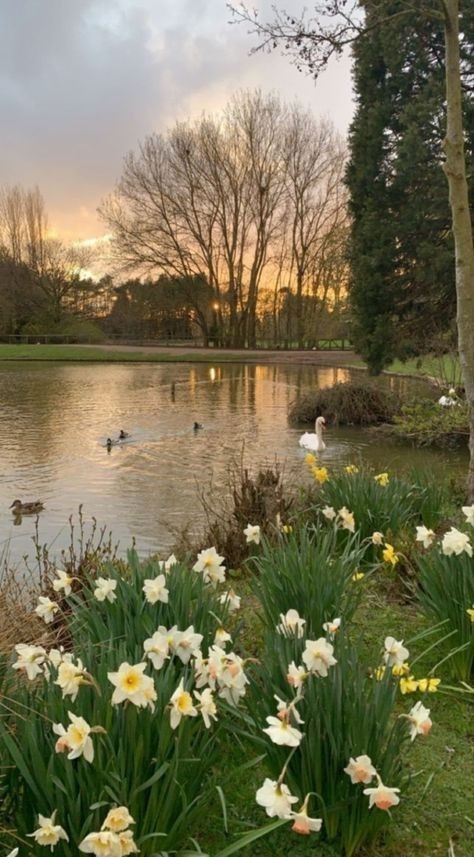

hey! today it was a good day and i was able to appreciate even the little things. i woke up early and i completed my skincare routine🧚♀️
i also:
did some housework🧹
called my family and talked to one of my little sisters who was making cookies👨👩👧👦
went grocery shopping🍎
went for a walk by the sea🌊

uni things
i didn't study infectious diseases today because I will dedicate the whole next week to it. also i'm so happy to do my internship in pediatrics and tomorrow i'll see the kids again and i'll discuss with the professor about my thesis there. i don't know if i'll be able to become a pediatrician in the future but at the momente it is my only source of motivation, maybe i can do it 🩺
Language things
MANDARIN CHINESE: i continued with my Superchinese app lesson. today I've learned some vocab about simple activities (书,看,电影,做) and the grammar 想 whic means want to. my writing is still bad but ill try to improve it 🇨🇳

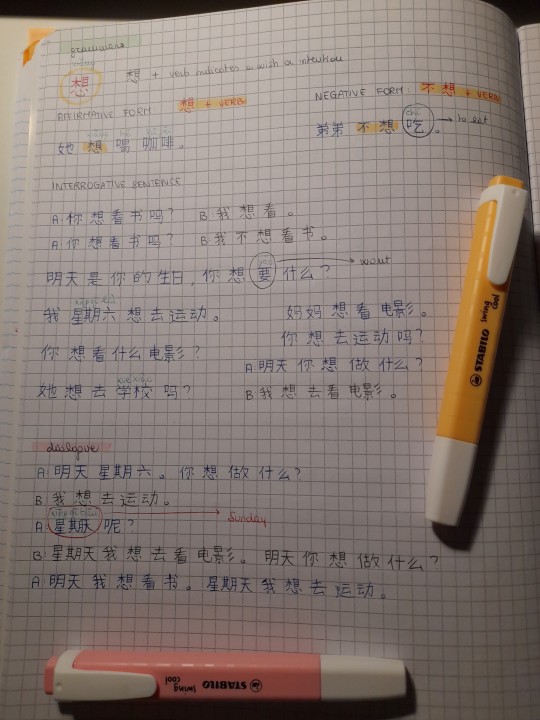
KOREAN: the clip from the seventeen's blog in Budapest seems endless lol. jokes aside, i focused on the various forms of 것 같다 (present, past and future tenses) and I practiced them with my own example sentences. also I found out new usages of the verb 보다 to express past experiences and to recommend to try something. I also found out how to say i burned my tongue while i was tasting the food (literally what happened to me yesterday !!) 맛을 보다가 혀를 데었어요. I share my really disorganized notes but I like them in that way🇰🇷
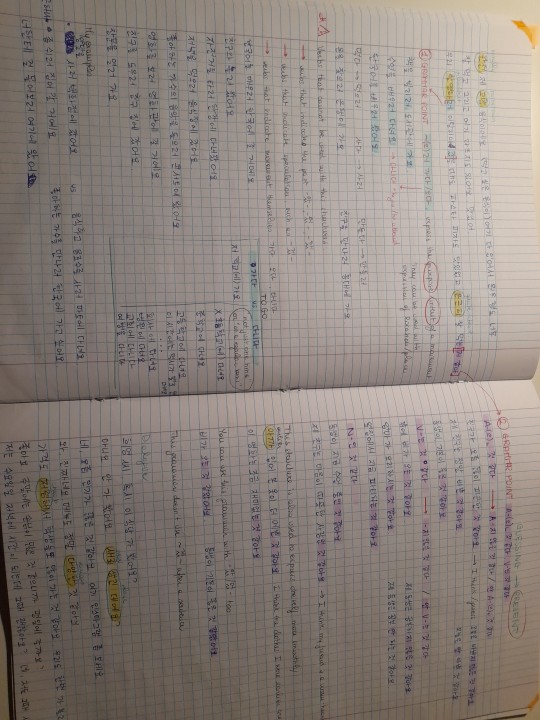
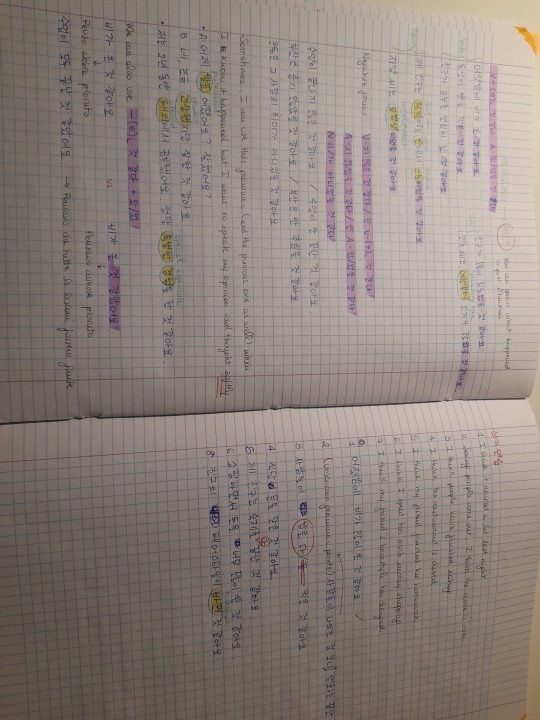


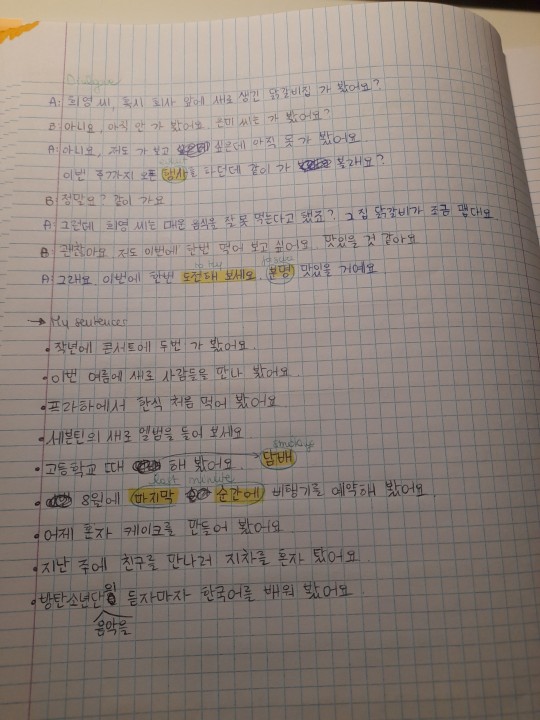
i didn't practice any japanese today, i just played some game of shiritori and kanji quiz on the renshuu app 🇯🇵
now im going to shower and semi-dress up to go out with my friend, it was a good day!
song of the day
my love mine all mine - mitski (again)
i don't understand but I love you - seventeen
#studyblr#uni life#study motivation#self care#skincare#language blr#chinese langblr#korean langblr#japanese langblr#bts#seventeen#dokyeom#dk#lee seokmin
17 notes
·
View notes
Text
LANGUAGE LEARNING PAC: WHICH LANGUAGE SHOULD YOU LEARN?

Row 1: ♤ Knight of Cups ♤ JAPANESE ♤ 日本語 ♤ にほんご ♤
Japanese is a highly intuitive language with plenty of words which don't translate properly to English to describe unique emotions and cultural practices such as forest bathing and viewing the sakura blossom in spring. Japanese onomatopoeia also requires you to use emotional intuition and with the fluid energy of the knight of cups flowing your way you will enjoy immersing yourself in a beautiful language and culture.
Row 2: ♡ Ace of Swords ♡ MANDARIN ♡ 中文 ♡ 汉语 ♡ 普通话
With a sharp intellect, you relish a challenge and as a result you will love Mandarin, which uses characters instead of a full alphabet. Mandarin is part of the Sino Tibetan language family and is spoken as the official language in Mainland China as well as places like Singapore and amongst the Chinese diaspora. Learning characters might appear daunting at first, but that intellectual energy is flowing your way and you are totally in your element here!
Row 3: ☆ 10 of Coins ☆ KOREAN ☆ 한국어 ☆ 韩国语
An agglutinative language with a SOV structure, the now disproven Altaic hypothesis proposed a distant link between Korean and Mongolian. The Korean language is now believed to be totally unique and with KPop and KDrama this is your gateway to a totally different world, from the female-centric shamanistic mudang practices in The Cursed to the class and beauty of modern Seoul and Korean history in Hotel del Luna. Korean is a language which can broaden your horizons and make you want to travel, and then ten of coins indicates this language can bring a turning point in the material world around you.
#japan aesthetic#language#langblr#language blog#language blr#tarot pick a card#tarot pick a pile#messy moodboard#soft aesthetic#study aesthetic#study ambience#study blog#study with me#studyspiration#studywithme#studyblr#studyspo#study blr#japanese stationary#japanese stationery#lofi aesthetic#lofiwave#lofiedits#lofi girl#lofi boy#messy aesthetic#korean stationery#korean stationary#日本語の勉強#한국어
102 notes
·
View notes
Text
Poésie mercredi#4
"L'Oiseau de Nuit" by Jean Cocteau
L'oiseau de nuit, il vole sans bruit Il est seul dans la nuit, il est seul dans la ville Il cherche une lumière, il cherche une étoile Il voudrait trouver une âme, il voudrait trouver un abri Mais la ville est froide, et personne ne le voit.
Every Wednesday, I share French poetry here on my blog.
#poésiemercredibytsw#frenchpoem4#poetry#academia#literature#french literature#learning french#intermediate french#french poems#love poetry#language blr#french langblr#french poem#french poetry
51 notes
·
View notes
Text
94% of people kick off their Hebrew learning solo or with apps. It makes sense, right?
It's handy, flexible, and you get to call the shots on when and where. But here’s the catch:
Going it alone can lead to patchy learning. You might find yourself hopping from one resource to another, trying to piece together a full picture.
This can leave you with more questions than answers, using up your time, effort, and sometimes even cash without clear direction.
When you do decide to level up by choosing a structured path—like a dedicated program, an app, or a tutor—and you start noticing things like doubts about your ability, lack of progress despite hard work, or dwindling enthusiasm, take that as a big red flag.
These aren’t just little bumps; they’re signs that your learning strategy might not be the right fit.
Let's be clear: feeling a bit out of your comfort zone is part of learning a new language. That's normal. But there’s a huge difference between the natural challenge of picking up new skills and feeling like you’re just not getting anywhere.
Hebrew is a rich, beautiful language, but not all teaching methods unlock its full potential. It’s easy to feel overwhelmed and confused without the right guidance. This doesn’t have to be your learning story.
Imagine a learning experience where:
- Your effort is clearly reflected in your progress.
- Doubts about your ability turn into confidence in your skills.
- Initial enthusiasm evolves into a deep, lasting passion.
- Confusion gives way to clarity and understanding.
- Your confidence in Hebrew grows with every lesson.
That’s what learning Hebrew should feel like!
I’m here to offer a different approach, one that gets you thriving in Hebrew.
If you're ready to transform your Hebrew learning experience and see real results, let's take this journey together.
Rediscover your love for Hebrew, and see just how rewarding learning can be when you have the right guide, method, and support.
#hebrew#learnhebrew#jewish#hebrew langblr#language#hebrewbyinbal#israel#language learning#jumblr#langblr#languages#language classes#language blr#language education
3 notes
·
View notes
Photo


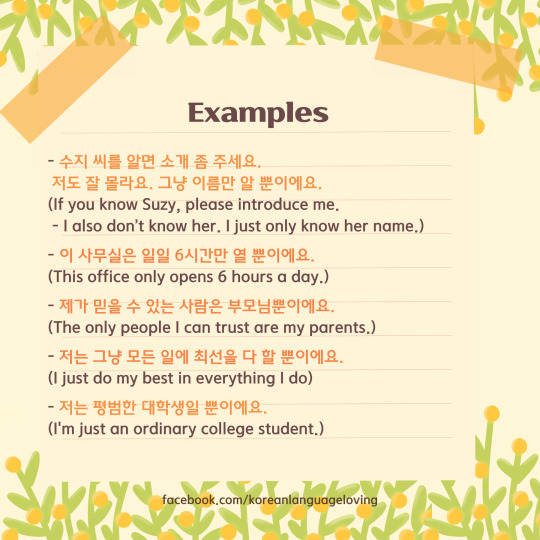
𝐊𝐨𝐫𝐞𝐚𝐧 𝐆𝐫𝐚𝐦𝐦𝐚𝐫: A/N/V-(으)ㄹ 뿐이다 ✏️ 𝐔𝐬𝐚𝐠𝐞 - This expression is used when there is only one available course of action or state of being. In such case, 뿐 has the same meaning as 오직 (solely, merely, only) - It is typically translated as “only”, “just” or "to be nothing but” E.g. 저는 한국어를 공부할 뿐이에요. (I'm only studying Korean.) ✏️ 𝐒𝐩𝐞𝐜𝐢𝐚𝐥 𝐍𝐨𝐭𝐞𝐬 (1) "(으)ㄹ 뿐” can also be used in the middle of the sentence. E.g. 그 분의 얼굴만 알 뿐 성함을 몰라요. (I only know his face but don't know his name.) (2) "(으)ㄹ 뿐이다" can be replaced with "(으)ㄹ 따름이다" with no change in meaning. However, "(으)ㄹ 따름이다" is more commonly used in formal writing (쓰기) or professional settings. E.g. 최선을 다 할 뿐입니다. → 최선을 다 할 따름입니다. (I just do my best.) (3) “(으)ㄹ 뿐만 아니라” is also an expression used to describe the extent or limit of a situation. It indicates that there is more to a situation than just what is mentioned and can be translated as “not only A but also B”. E.g. 그 사람은 영어를 잘할 뿐만 아니라 프랑스어도 잘 합니다. (That person not only speaks English well but also French well.) ✏️ 𝐂𝐨𝐧𝐣𝐮𝐠𝐚𝐭𝐢𝐨𝐧 - Present: A/V-(으)ㄹ 뿐이다 알다 -- 알 뿐이다 열다 -- 열 뿐이다 - Past: A/V-았/었을 뿐이다 들다 -- 들었을 뿐이다 열다 -- 열었을 뿐이다 - Noun + -(일) 뿐이다 꿈 -- 꿈일 뿐이다 -- 꿈뿐아다 낭비 -- 낭비일 뿐이다 -- 낭비뿐이다 ✏️ 𝐌𝐨𝐫𝐞 𝐄𝐱𝐚𝐦𝐩𝐥𝐞𝐬 1. 지금은 아무 것도 하고 싶지 않아요. 잠만 자고 싶을 뿐이에요. (I don't want to do anything right now. I just want to sleep.) 2. 오늘 회의를 8시간이나 했는데 결정된 것은 없고 시간만보냈을 뿐이네요. (We had a meeting for 8 hours today, but nothing was decided, and it was just a waste of time.) 3. 나를 생각해 주는 사람은 부모님뿐이에요. (The only people who care about me are my parents.) 4. 저는 당신에 대해 생각할 뿐이에요 (I'm just thinking about you.) 5. 왜 당신은 화가 났어요? 저는 농담했을 뿐이에요. (Why are you getting angry? I was just joking.) #KoreanGrammar #KoreanLanguage #Studywithme #한국어공부
-
🌸 🌼 🌻
Support me at: https://koreanlanguageloving.my.canva.site/
#Korean Grammar#Korean Language#language blr#korean langblr#Learn Korean#Study Korean#Hangul#한국어공부중#한국어공부해요#한국어 공부하기#한국어공부하기#한국어공부#한국어 단어#한국어배우기#한국어능력시험#한국어 배우기#한국어#한국어 문법
21 notes
·
View notes
Text


my fav study buddy <3
#studyblr#study blog#studyinspo#studyspo#ancient greek#uni studyblr#study motivation#studying#study aesthetic#language blr#langblr#language study#study buddy#study inspiration#uniblr#uni student#university student#uni life#uni blogging#university life
267 notes
·
View notes
Text



Something in myself rejects me Perhaps I am someone else.


If it was a piece of paper, I would tear it. If it was bottle, I would break it. If it was a wall, I would tear it down,- but it is my heart.


I can't forget you, not because I have a strong memory, but because I have a heart that never denies those who settled in it once.

Are we what we do with time, or are we what time does with us?

#web weaving#longing#mahmoud darwish#dark acamedia#dark acadamia quotes#dark acadamia aesthetic#classic literature#english literature#literature#lit#light academia#light acadamia aesthetic#cottage academia#spilled writing#spilled thoughts#poetry spilled ink#poetic prose#chaotic academic aesthetic#language blr#books & libraries#poetry#quotes#books and quotes#dark aesthetic#art#words#queue#web weavings
777 notes
·
View notes
Text
Poiché mi piace guardare film italiani di serie B, soprattutto film di exploitation, mi piace molto imparare l'italiano.
#sofiaflorina#ソフィアフロリナ#italian language#italian#italiano#language learning#learning languages#learning language#polyglot#polyglots#polyglot community#polyglots community#language learner#language learners#language#languages#language stuff#language study#languages are fun#languages are easy#language blog#language blr#language tumblr#langblog#langblr#langbr#lang blog#italian film#italian films#italian movie
0 notes
Text
Learning European languages be like
"Does une trousse mean trousers in English" "Oh it's pen case"
0 notes
Text
How to find a language partner
Regardless of whether you're learning for fun, to boost your career, to get in touch with your culture, or for travel, you'll definitely need a language partner at some point, mainly for speaking practise.
You can repeat the same textbook dialogue all you want, but unless you actually practise what you learn with someone else, whether it's a native speaker, your grandmother or your classmate, achieving a near perfect or fluent level will be really difficult.
Here are my top suggestions for finding a language partner!
1. Your local language Institute
The German Geothe Institute, or the Mandarin Confucius Institute or any other Centre - they all usually hold mixers and get-to-knows, so attending one of their events is a great way of meeting fellow language learners and native speakers, who you can study with, and become friends with.
You don't necessarily need to be a member or a student of these organizations, but its always a good idea to check as different countries and regions may have their own specifications.
2. Use apps
Tandem, HelloTalk etc. Pretty decent way of meeting native speakers who want to learn your language, so it works out quite well.
The downside is that online platforms can be full of creepy people that will often derail the conversation into something unexpectedly inappropriate , so stay safe out there.
3. Your university or school clubs
Many unis have language or cultural clubs, so ask around to see if there's a club out there for your target learning language. You can learn quite a lot, and not just the language, but also about recepies, lesser known customs etc. Quite an amazing option, so try it out.
If not, chances are there might be a group in your city, so check out the Facebook groups. There's probably something out there.
4. Friend of a friend of a friend chain
That's the beauty of connections. Your friends cousin might be friends with a native speaker of the language you're learning, who's studying in the same city as you are.
Don't be afraid to reach out, or to ask your friend to pass along your request. If it doesn't work out, then hey. There are always going to be opportunities, so don't stress it.
#language blr#student#aesthetic#studyblr#chinese#slavic roots western mind#japanese#korean#vietnamese#mandarin#french#german#spanish#danish#latin#languagelearning#russian#mandarin langblr
46 notes
·
View notes